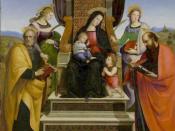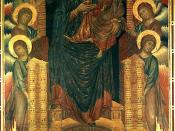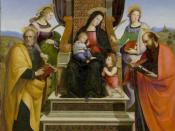Raphael's Madonna and Child Enthroned with Saints
and
Cimabue's Madonna and Child Enthroned (Maesta)
By Lucky Charmz
Cimabue and Raphael were each great painters whose works were heavily influenced by the different times in which they lived. Cimabue lived during the late Middle Ages, a time when the people of Europe found comfort in religion and art. He followed in the style of Greek painters who taught him Byzantine techniques (Scala, "Cimabue" 3). Cimabue followed this Byzantine tradition of religious themes done in a flat, decorative, non-three dimensional style. Cimabue was such an influential artist that he created the base for Giotto's and Duccio's artistic career. Raphael was a master of Renaissance painting and mastered all of the techniques that were discovered mainly in this time period. The Renaissance was a period in which architecture, art, literature and scientific discoveries flourished. During this period, painters began to understand perspective more clearly.
This period is commonly referred to as the "Golden Ages" because of all the historical and art-related discoveries. Raphael, like most other Renaissance painters, focused religious themes, but unlike Cimabue, he used perspective and shadow to add a much more realistic feel to his work.
Giovanni Cimabue was the great master of the period before Giotto. Cimabue painted during the Middle Ages. (Scala, "Cimabue" 5) The Middle Ages was a time where barbarian attacks, disease, famine, and poverty were a part of everyday life. Because of these attacks and horrors, people turned to religion and interpreted it through art. Cimabue found comfort in art and spent a large deal more time working on art than working on his class work. (Scala, "Cimabue" 3). He worked as an apprentice under artists from Greece and imitated their art. Instead of copying the work directly, he actually removed any imperfections of their...



Complete
A really fantastic piece of work, well referenced. A good comparison of the different style of the two artists, a little more on what was going on politically at the time always helps to "flesh out" the artist's intentions, but hey - year 8, not bad at all.
0 out of 0 people found this comment useful.